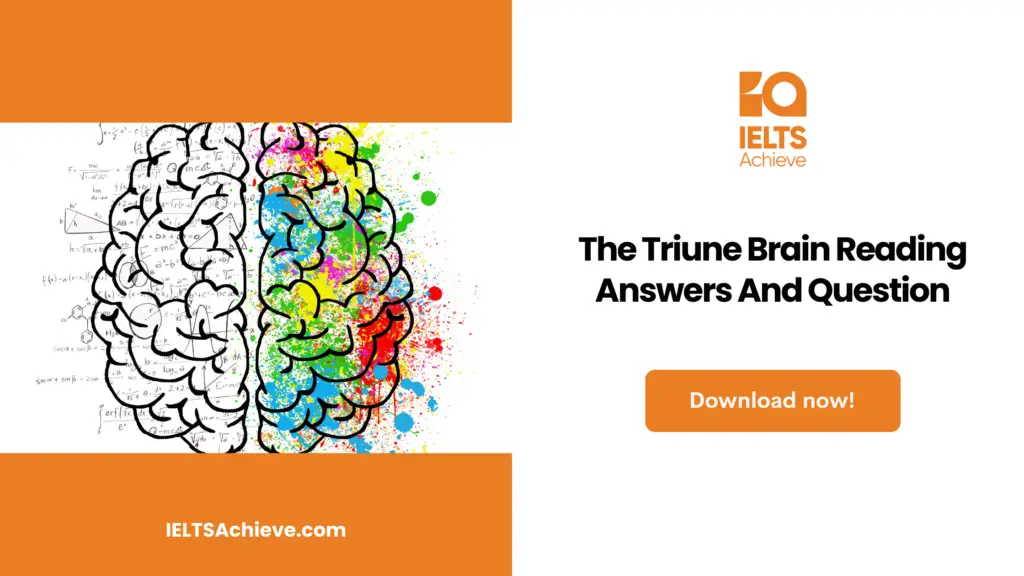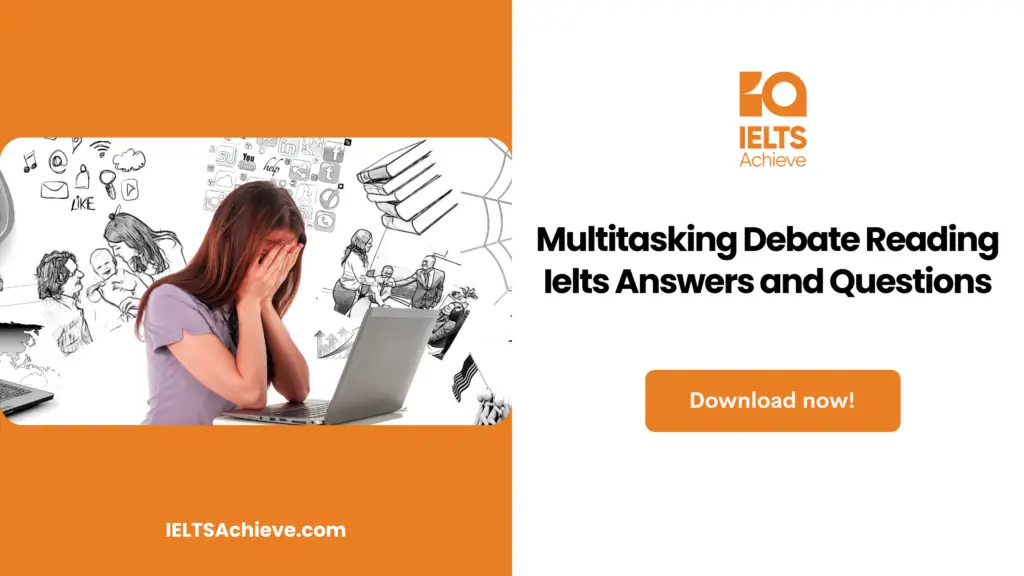The Blog post contains the following IELTS Reading Questions:
- IELTS Reading Matching Features
- IELTS Reading Summary Completion
- IELTS Reading Sentence Completion
Stay informed and prepared for success – Explore our comprehensive Reading Test Info page to get valuable insights, exam format details, and expert tips for mastering the IELTS Reading section.
IELTS reading passage – The Triune Brain

The Triune Brain
Scientists have identified the reptilian cortex as the first of our three brain regions to evolve. This brain ensures that the body can do the most fundamental functions necessary for survival, like breathing, resting, and keeping the heart pumping. It is not necessary for us to “think” about these pursuits. The “startle centre,” a system that allows us to respond quickly to sudden and unexpected events, is likewise located in the reptilian cortex. The reptilian cortex is responsible for your startled lurch when a door smashes elsewhere in the house and your heightened awareness when a twig cracks in a nearby bush on your evening stroll. The reptilian brain has only the most primitive impulses when it comes to social interaction, such as aggression, mating, and territorial defence. A crocodile protecting its territory along the river is not different to a turf fight between rival gangs in the city.
The lizard may be possessive of its territory, but it doesn’t care one bit about the welfare of its offspring. It is evident that something new is happening when one hears the emergency call of a dolphin separated from its pod or when one sees elephants grieving for their dead. The limbic cortex has been recognised by scientists. The limbic cortex, found only in mammals, motivates animals to care for their young by flooding the parent with sensations of love and comfort while their young are in direct range. Mammals, like humans, are motivated to form bonds with others through emotional experiences. Our pleasant feelings of togetherness, unity, and comfort are amplified when we are with people of “our kind,” whether at a soccer practice, a church service, a school assembly, or a bar. We become lonely and motivated to seek connection if we spend too much time apart from these networks.
It is only in humans that these two cortex are responsible and are able to scratch the surface of what is possible. We eat, sleep, and play like any other animal, but we also talk, scheme, reason, and argue over the finer details of morality. The neocortex, the expansive third brain responsible for reasoning, planning, and conceptualization, is largely responsible for our special abilities. The neocortex’s strength lies in its capacity to reflectively consider issues beyond the scope of the immediate situation. Although some mammals, like apes, can learn and remember basic lessons, only humans are capable of considering the “big picture” at the same time as acting on impulse. We can construct complex theories of physical or social phenomena by stringing together elementary insights (an apple falls from a tree; hurting others leads to unhappiness, etc). (For example, gravitation laws and a concern for human rights).
When strung together, these decisions can add up to achievements that cannot be matched by any other animal. When a student knows that getting enough sleep will help them perform better on an exam the next day, it can be easier to overcome the limbic system’s natural instinct to keep them up late socialising. This unending dedication over three years will yield a first-class degree and funding for further education; over a lifetime, it could lead to significant advancements in our understanding of the world and its inhabitants. The neocortex is responsible for our ability to delay gratification now in exchange for greater rewards later.
The complexity of brain damage and mental disorder can be better understood with a triune brain in mind. For instance, brain death is widely recognized as the most severe form of brain damage. The person may appear to be merely unconscious, perhaps sleeping, but this is a deceptive appearance. In this case, the reptilian brain is operating automatically despite the unrecoverable breakdown of other cortexes.
It’s important to note that the limbic cortex registers disturbances in a different way. Pups with brain injuries to the limbic system are able to get around and take care of themselves nutritionally, but they are unaware of their littermates’ presence. According to t scientists, “one impaired monkey stepped on his outraged peers as if treading on a log or a rock” after undergoing a limbic lobotomy2. In humans, damage to the limbic system is linked to sociopathic behaviour. Full-neocortex sociopaths are typically shrewd and emotionally intelligent as the average person, but they have severe difficulties forming meaningful connections with others and showing compassion.
A metal rod skewered railway worker Phineas Gage’s skull, removing a significant portion of his neocortex, and yet he survived the injury. Gage’s coworkers noticed a change in his equilibrium, even though he continued to live and work as before. Even as his intellectual abilities declined, Gage’s animal tendencies became more pronounced, and he began making increasingly crude jokes. Nonetheless, recent research suggests that Gage was able to smooth out these distressing transitions and rediscover acceptable social behaviour over time. This suggests that patients with severe brain injuries may benefit from reparative therapy in order to improve their quality of life. __________________________________________
1 Triune = three-in-one
2 Lobotomy = brain nerves are cut by surgery.
Unlock your full potential in the IELTS Reading section – Visit our IELTS Reading Practice Question Answer page now!
Recommended Questions:
Renewable Energy IELTS Reading Question with Answer
The Triune Brain IELTS Reading Questions
Questions 1-5
Classify the following as typical of:
A. the reptilian cortex
B. the limbic cortex
C. the neocortex
Write the correct letter, A, B or C, on your answer sheet in boxes 1-5
- Giving up happiness in the short term for gains in the long run.
- Maintaining the functions of the body that are necessary for life.
- To feel the pain of losing someone.
- Putting together groups and communities.
- Making a choice and sticking to it.
Improve your performance in Matching Features questions by clicking here to access our comprehensive guide. Learn how to match specific features or characteristics with the options provided in the IELTS Reading section.
Questions 6-9
Complete the summary below. For each response, choose NO MORE THAN TWO WORDS AND/OR A NUMBER from the passage.
The 6. _____________excels in looking at the big picture and thinking about things that might not be immediately relevant. Other species, like 7.______________, have a somewhat good memory and can acquire new information, but only humans can think strategically while also acting on 8. ___________. Simple observations (an apple falls from a tree; injuring others causes suffering) can be strung together to form more 9. ____________ of physical or social phenomena (such as the laws of gravity and a concern for human rights).
Boost your performance in Summary, Notes, Table, and Flowchart Completion tasks. Click here to explore our detailed guide and learn how to effectively complete summaries, notes, tables, and flowcharts in the IELTS Reading section.
Questions 10-13
Complete the blanks below.For each answer, write NO MORE THAN TWO WORDS from the passage. Write your answers on your answer sheet in boxes 10–13.
10. A person who only has a reptilian cortex that functions is called_______________
11. ____________ in humans is associated with disorders in the limbic system.
12. Phineas Gage lost part of his ____________ because of an accident in the Industry.
13. After his accident, Gage’s coworkers noticed a difference between __________ and how he thought.
Enhance your sentence completion skills in the IELTS Reading section. Click here to access our comprehensive guide and learn effective strategies for filling in missing words or phrases in sentences.
Unlock your full potential in the IELTS Reading section – Visit our IELTS Reading Practice Question Answer page now!
Recommended Questions:
Renewable Energy IELTS Reading Question with Answer
The Triune Brain Reading Answers
1. C
2. A
3. B
4. B
5. C
6. Neocortex
7. Apes
8. Impulse
9. Elementary insights
10. Brain Dead
11. Sociopathic behaviour
12. Neocortex
13. Animal propensities

We hope you found this post useful in helping you to study for the IELTS Test. If you have any questions please let us know in the comments below or on the Facebook page.
The best way to keep up to date with posts like this is to like us on Facebook, then follow us on Instagram and Pinterest. If you need help preparing for the IELTS Test, join the IELTS Achieve Academy and see how we can assist you to achieve your desired band score. We offer an essay correction service, mock exams and online courses.

